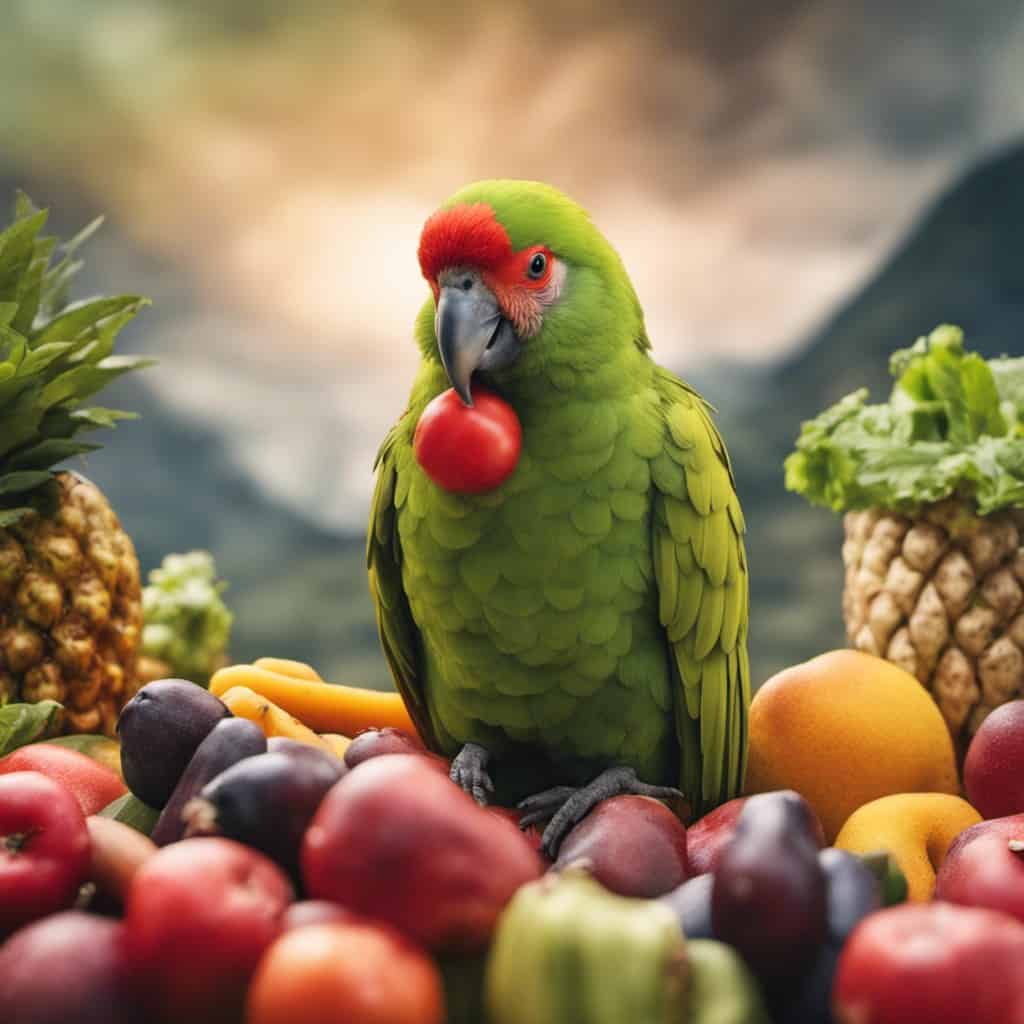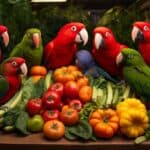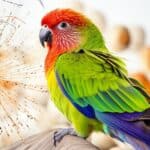Welcome to our guide that answers the question, What do Kakarikis eat? As a pet owner, it’s important to understand the dietary needs of your feathered friend to ensure a long and healthy life. Like any other living creature, a balanced and nutritious diet is essential for Kakarikis.
In this article, we will provide an overview of the Kakariki diet and offer guidance on how to feed your bird correctly. We’ll address common dietary issues and concerns and answer some frequently asked questions about feeding Kakarikis.
So, whether you’re a new or experienced owner, read on to learn more about what to feed your Kakariki to keep them healthy and happy.
What Do Kakarikis Eat? Basic Diet Requirements for Kakarikis
To ensure the health and happiness of your feathered friend, it’s essential to provide a balanced and nutritious diet. A basic Kakariki diet consists of fresh fruits, vegetables, seeds, and pellets.
When feeding your bird, remember that variety is crucial. Aim to offer a mix of different foods to provide a range of nutrients.
Fresh fruits and vegetables
Fresh fruits and vegetables should comprise a significant portion of your Kakariki’s diet. Different fruits and vegetables, such as apples, pears, strawberries, spinach, carrots, and broccoli, are offered daily.
Be sure to thoroughly wash all fruits and vegetables and remove any seeds or pits before feeding them to your bird.
Seeds
Seeds are essential to a Kakariki’s diet as they provide an excellent energy source and nutrients. Opt for high-quality seed mixes that contain a variety of seeds, such as sunflower, pumpkin, and safflower seeds.
Avoid feeding your bird fatty seeds, such as peanuts, and limit the number of sunflower seeds they consume, as they are high in fat.
Pellets
Pellets are a great source of balanced nutrition and can be fed as part of your Kakariki’s diet. Look for high-quality pellets that are specifically formulated for parakeets or small parrots.
While pellets are a nutritious addition to your bird’s diet, they should not be the only food they consume. Be sure to provide a mix of fresh fruits, vegetables, and seeds.
Protein Sources for Kakarikis
Protein is a vital nutrient that helps keep Kakarikis healthy and strong. While seeds and fruits are excellent sources of carbohydrates and vitamins, they lack sufficient protein content. Hence, including protein-rich foods in your Kakariki’s diet is crucial.
Insects are an excellent source of protein for Kakarikis. Kakarikis feed on various insects in the wild, including caterpillars, moths, and crickets. As such, you may consider including live insects or dried mealworms in your Kakariki’s diet. Make sure to purchase insects from reputable sources and avoid collecting them from your backyard or other outdoor areas that could be exposed to pesticides or harmful substances.
| Protein Sources for Kakarikis | Benefits |
|---|---|
| Insects (e.g., crickets, mealworms) | Excellent source of protein and other nutrients, mimic their natural diet |
| Eggs | A good source of protein, calcium, and vitamins |
| Lean meats (e.g., boiled chicken, turkey) | Another source of protein, but only should be given in moderation, make sure to remove bones and skin before feeding |
Eggs are another beneficial source of protein for Kakarikis. You may offer them boiled or scrambled but do not add salt or seasoning. Eggs also contain calcium and vitamins, making them an excellent addition to your bird’s diet.
Finally, lean meats like boiled chicken or turkey also offer moderate protein that can benefit your Kakariki. However, it is essential to feed these in moderation, as they can be high in fat and may cause digestive issues if overfed. Remove any bones or skin before offering them to your bird.
Remember that Kakarikis require a balanced and nutritious diet to maintain optimal health. If you are unsure about your bird’s dietary needs or have any concerns, seek advice from a veterinarian specialising in avian health.
Treats for Kakarikis
Treats are an important part of your Kakariki’s diet, as they can offer additional nutrients, help with training, and provide mental stimulation. However, choosing treats carefully and offering them in moderation is important to prevent overfeeding and potential health issues. Here are some healthy snacks that are suitable for your pet Kakariki:
| Treat | Description |
|---|---|
| Apples | Fresh slices of apple are a good source of vitamin C and other nutrients. Remove the seeds and core before serving. |
| Grapes | Seedless grapes can be a sweet treat for your Kakariki. Cut them into small pieces to prevent choking. |
| Carrots | Carrots are high in fibre and provide a good workout for your Kakariki’s beak. Serve them in small pieces or grated. |
| Cooked egg | A small amount of cooked egg can be a good source of protein for your Kakariki. Avoid feeding raw egg or eggshells. |
Always wash fruits and vegetables thoroughly before serving them to your Kakariki. Avoid offering treats high in fat, salt, or sugar, such as processed foods, chocolate, and nuts. Consult your vet if you’re unsure about a particular treat’s suitability.
Potential Dietary Issues and Concerns
Feeding your Kakariki a balanced and nutritious diet is essential for their health and well-being. However, as a pet owner, you may need to know about some dietary issues and concerns. Here are some common problems and how to manage them:
Obesity
Kakarikis can easily become overweight if overfed or given too many treats. This can lead to health issues such as heart disease and joint problems. To prevent obesity, make sure you are feeding your Kakariki a balanced diet with appropriate portion sizes. Avoid overfeeding with treats and try to incorporate physical activity into their daily routine.
Vitamin Deficiencies
Kakarikis can suffer from vitamin deficiencies if they are not getting a varied diet that includes fresh fruits and vegetables. This can lead to health problems such as feather plucking and a weakened immune system. Ensure your Kakariki is getting a balanced diet with various nutrient-rich foods. Consider offering a vitamin supplement if necessary, but consult a veterinarian first.
Seed-Based Diets
Kakarikis love seeds, but a seed-based diet is not balanced or healthy. Seeds are high in fat and low in nutrients, which can lead to obesity and vitamin deficiencies. Ensure your Kakariki gets a variety of fresh fruits and vegetables along with a high-quality pellet or mash. Seeds can still be included in their diet, but in moderation.
Feeding Insects
Feeding insects to your Kakariki can provide a good source of protein and nutrients, but it’s important to do so safely. Ensure the insects are from a reputable source and have not been exposed to pesticides. Avoid feeding insects caught in the wild, as they may carry diseases or parasites that could harm your bird. Always supervise your Kakariki when feeding them insects to ensure they do not choke or have an allergic reaction.
If you notice any unusual behaviour or changes in your Kakariki’s health, it’s important to consult with a veterinarian. They can guide your bird’s dietary needs and help you address any issues or concerns.
Frequently Asked Questions about What Do Kakarikis Eat?
Feeding your pet Kakariki requires careful attention to their diet. Below are some frequently asked questions about feeding Kakarikis:
How much should I feed my Kakariki?
Monitoring your Kakariki’s food intake is important to ensure they are not overfed. Offer one to two tablespoons of food daily and adjust according to their appetite and activity level.
What types of fruits and vegetables should I feed my Kakariki?
Offer a variety of fresh fruits and vegetables, including leafy greens, carrots, apples, and berries. Avoid feeding them avocados or citrus fruits, as these can harm birds.
Can Kakarikis eat seeds as their main source of food?
While seeds are an important part of their diet, they should not be the only food source as they lack essential vitamins and minerals. Be sure to offer a balanced mix of fruits, vegetables, and seeds.
Can I feed my Kakariki cooked food?
Cooked food can be offered to your Kakariki as a treat, but it should not be their main food source. Avoid feeding them any food containing salt, sugar, or spices, as these can harm birds.
How often should I offer treats to my Kakariki?
Treats should be offered in moderation to avoid overfeeding. Aim to offer treats no more than once or twice per week, and always choose healthy options such as fresh fruit or small pieces of unsalted nuts.
What should I do if my Kakariki stops eating?
If you notice that your Kakariki has stopped eating or is eating less than usual, this may indicate an underlying health issue. Contact your veterinarian for advice on how to proceed.
Do I need to provide my Kakariki with supplements?
In most cases, a balanced diet consisting of fresh fruits, vegetables, and seeds will provide your Kakariki with all the necessary nutrients they need. However, if you have any concerns about their diet, you should consult your veterinarian about whether supplements are necessary.



Have comments or questions about this article? Then get involved!
Spotted an error or something we have missed? Let us know